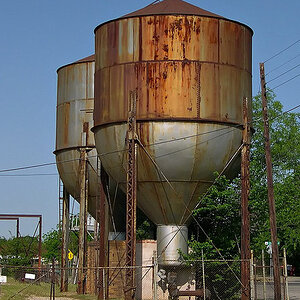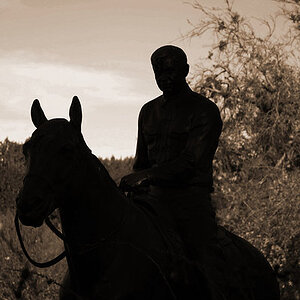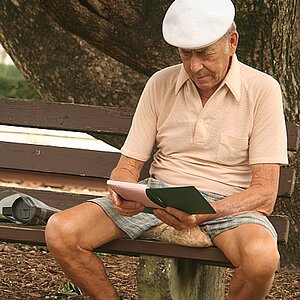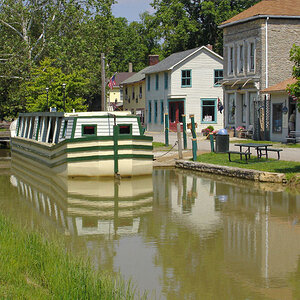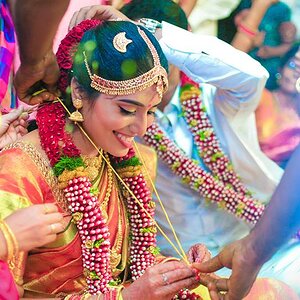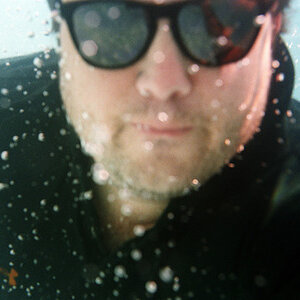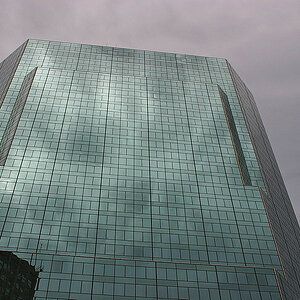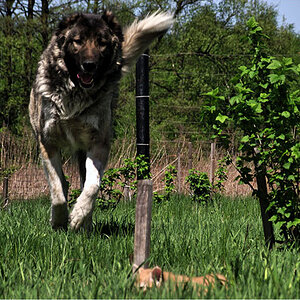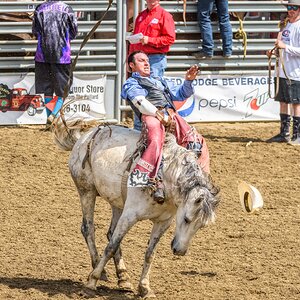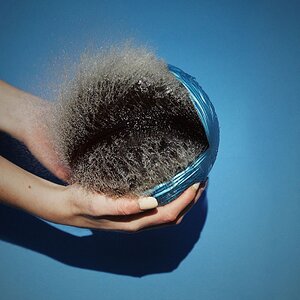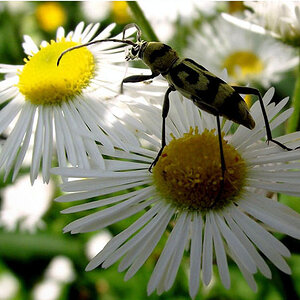Navigation
Install the app
How to install the app on iOS
Follow along with the video below to see how to install our site as a web app on your home screen.

Note: This feature currently requires accessing the site using the built-in Safari browser.
More options
You are using an out of date browser. It may not display this or other websites correctly.
You should upgrade or use an alternative browser.
You should upgrade or use an alternative browser.
SO, you just got a new DSLR.
- Thread starter radiorickm
- Start date
Ballistics
Been spending a lot of time on here!
- Joined
- Jun 5, 2011
- Messages
- 3,781
- Reaction score
- 633
A rational person would realize that nearly everything falls within some sort of gray area. If this weren't the case, then AI wouldn't focus so heavily on fuzzy logic. Just something to think about.
If you are new to photography, and you see this list as a sticky, wouldn't the rational thing to do be look at this list as a straight forward guide and not a "sometimes this may be true" list?
The OP isn't even true most of the time.
But insisting that skill has nothing to do with is and gear has everything to do with it is wrong. It's a mixture of both. A better skilled photographer can usually get away with using gear that isn't as good or doesn't have the features. Do you really need a Canon 5D MKIII to do HDR photos since it has a feature that does it in camera? Kerby's argument would state yes. If that's the case, how come people have been doing HDR photos for a far longer period of time than cameras with built in features have been out. Just like someone that has a bit of skill doesn't necessarily need a tripod for long exposure shots. They can most likely find something else to steady the camera with. Gear does make a difference. Skill also makes a difference. A skilled photographer with better gear that knows about posing and keeping their subjects comfortable will do better with portraiture than a noob that has $30,000 in gear and no prior experience shooting people.
I'm not insisting that skill is irrelevant. In fact I said that skill matters. But the fact of the matter is, the OP's is taking credit away from better gear.
I'm not a newb, I'm not a pro. I don't know what to classify me as. But better gear makes learning so much easier for me. And I take better pictures with better gear.
The argument shouldn't be newb vs pro, because that's too easy. The argument should be newb vs newb, or pro vs pro each comparison being the same person. Makes the equipment much more relevant and it gives the more realistic message: Yeah, learning the ropes is important, but so is the gear.
If you turn your nose up at someone for buying high end equipment with low end skill, just remember, skill can be refined and improved. The cheap POS lenses and body that you insisted they buy first can not be.
timor
Been spending a lot of time on here!
- Joined
- Feb 28, 2011
- Messages
- 5,905
- Reaction score
- 890
- Location
- Toronto ON
- Can others edit my Photos
- Photos NOT OK to edit
Very funny tread. Why someone with high IQ instead of bragging about it just make a better guide ? Or is this tread revolving around the fact, that nine out of ten photographers think the tenth photographer is an idiot ?
prodigy2k7
No longer a newbie, moving up!
- Joined
- Apr 22, 2008
- Messages
- 1,668
- Reaction score
- 22
- Location
- California, USA
- Can others edit my Photos
- Photos OK to edit
IQ tests aren't accurate or consistent...
timor
Been spending a lot of time on here!
- Joined
- Feb 28, 2011
- Messages
- 5,905
- Reaction score
- 890
- Location
- Toronto ON
- Can others edit my Photos
- Photos NOT OK to edit
I see...IQ tests aren't accurate or consistent...
Ballistics
Been spending a lot of time on here!
- Joined
- Jun 5, 2011
- Messages
- 3,781
- Reaction score
- 633
The IQ (Image Quality) is proportional to the amount of time used to create it. If you grab your camera and take a picture, you have a snapshot. If you take your time, set up the shot, compose carefully, follow the rules, then you are going to have a chance of having a photograph as a piece of art.
I completely overlooked this. Oy vey. How is this a sticky?
mjhoward
TPF Noob!
- Joined
- Sep 22, 2010
- Messages
- 2,014
- Reaction score
- 414
- Location
- Bowling Green, KY
- Website
- www.michaeljeremie.com
- Can others edit my Photos
- Photos OK to edit
A rational person would realize that nearly everything falls within some sort of gray area. If this weren't the case, then AI wouldn't focus so heavily on fuzzy logic. Just something to think about.
If you are new to photography, and you see this list as a sticky, wouldn't the rational thing to do be look at this list as a straight forward guide and not a "sometimes this may be true" list?
The OP isn't even true most of the time.
But insisting that skill has nothing to do with is and gear has everything to do with it is wrong. It's a mixture of both. A better skilled photographer can usually get away with using gear that isn't as good or doesn't have the features. Do you really need a Canon 5D MKIII to do HDR photos since it has a feature that does it in camera? Kerby's argument would state yes. If that's the case, how come people have been doing HDR photos for a far longer period of time than cameras with built in features have been out. Just like someone that has a bit of skill doesn't necessarily need a tripod for long exposure shots. They can most likely find something else to steady the camera with. Gear does make a difference. Skill also makes a difference. A skilled photographer with better gear that knows about posing and keeping their subjects comfortable will do better with portraiture than a noob that has $30,000 in gear and no prior experience shooting people.
Exactly, and in the CONTEXT of this post, it wasn't intended to be from a newbie to a pro. It was written as a newbie to other UNSKILLED newbies. Regardless of how much money an UNSKILLED newbie that just picked up his/her DSLR throws at it, he/she will be just as capable of producing CRAP becuase they will still be UNSKILLED. I'm not saying that 100% of the information in the post was accurate, but from one UNSKILLED newbie to another UNSKILLED newbie, it is a good starting point for what they, an UNSKILLED person, should expect.
Village Idiot
No longer a newbie, moving up!
- Joined
- Mar 20, 2008
- Messages
- 7,269
- Reaction score
- 406
- Location
- Shepherdsturd, WV / Almost, MD
- Can others edit my Photos
- Photos NOT OK to edit
The IQ (Image Quality) is proportional to the amount of time used to create it. If you grab your camera and take a picture, you have a snapshot. If you take your time, set up the shot, compose carefully, follow the rules, then you are going to have a chance of having a photograph as a piece of art.
I completely overlooked this. Oy vey. How is this a sticky?
Sheer ignorance or mob mentality.
Kerbouchard
TPF Noob!
- Joined
- Apr 1, 2010
- Messages
- 2,697
- Reaction score
- 575
- Location
- DFW
- Can others edit my Photos
- Photos OK to edit
We'll try one more time. We will even keep it with consumer gear and newbies for the sake of comparison.
Let's say you hand one newbie a D3000 with an 18-55. Let's say you hand another newbie a D3000 with a 70-300. We will also say these two people are shooting the same subjects. For the sake of argument, we will put the camera into (P)rofessional Mode.
Will the pictures look the same?
Let's say you hand one newbie a D3000 with an 18-55. Let's say you hand another newbie a D3000 with a 70-300. We will also say these two people are shooting the same subjects. For the sake of argument, we will put the camera into (P)rofessional Mode.
Will the pictures look the same?
mjhoward
TPF Noob!
- Joined
- Sep 22, 2010
- Messages
- 2,014
- Reaction score
- 414
- Location
- Bowling Green, KY
- Website
- www.michaeljeremie.com
- Can others edit my Photos
- Photos OK to edit
We'll try one more time. We will even keep it with consumer gear and newbies for the sake of comparison.
Let's say you hand one newbie a D3000 with an 18-55. Let's say you hand another newbie a D3000 with a 70-300. We will also say these two people are shooting the same subjects. For the sake of argument, we will put the camera into (P)rofessional Mode.
Will the pictures look the same?
Clearly, you still don't get it. The point was not that the photos may look the same, because obviously there would be differences in DOF, distortion, etc. , but the point was both "setups" are capable of producing the same average crap snap shot With SKILL and EXPERIENCE, however, you could use either of these tools and produce something very pleasing.
Ballistics
Been spending a lot of time on here!
- Joined
- Jun 5, 2011
- Messages
- 3,781
- Reaction score
- 633
If you are new to photography, and you see this list as a sticky, wouldn't the rational thing to do be look at this list as a straight forward guide and not a "sometimes this may be true" list?
The OP isn't even true most of the time.
But insisting that skill has nothing to do with is and gear has everything to do with it is wrong. It's a mixture of both. A better skilled photographer can usually get away with using gear that isn't as good or doesn't have the features. Do you really need a Canon 5D MKIII to do HDR photos since it has a feature that does it in camera? Kerby's argument would state yes. If that's the case, how come people have been doing HDR photos for a far longer period of time than cameras with built in features have been out. Just like someone that has a bit of skill doesn't necessarily need a tripod for long exposure shots. They can most likely find something else to steady the camera with. Gear does make a difference. Skill also makes a difference. A skilled photographer with better gear that knows about posing and keeping their subjects comfortable will do better with portraiture than a noob that has $30,000 in gear and no prior experience shooting people.
Exactly, and in the CONTEXT of this post, it wasn't intended to be from a newbie to a pro. It was written as a newbie to other UNSKILLED newbies. Regardless of how much money an UNSKILLED newbie that just picked up his/her DSLR throws at it, he/she will be just as capable of producing CRAP becuase they will still be UNSKILLED. I'm not saying that 100% of the information in the post was accurate, but from one UNSKILLED newbie to another UNSKILLED newbie, it is a good starting point for what they, an UNSKILLED person, should expect.
Post 92.
Kerbouchard
TPF Noob!
- Joined
- Apr 1, 2010
- Messages
- 2,697
- Reaction score
- 575
- Location
- DFW
- Can others edit my Photos
- Photos OK to edit
Everybody on here should know that this argument, and the original post, is meaningless. Perhaps, I played the Devil's Advocate too hard.
My take on this is perhaps different than others. I primarily shoot weddings. A guest can walk up to me anytime and ask me why they aren't getting good shots. I set their camera for them, maybe let them borrow a flash, and they are off and away. At the end of the night, they come up to me and thank me.
No, they might not have mastered the rule of thirds or leading lines, but at least they were able to get some good shots of an event that they found important to them.
Other times, a guest hands me a point and shoot and asks me if I can take a photo of them. You know what? I do it...every time. And everytime it looks like a shot from a P&S.
I don't have a problem with that. If a guest asks me to take a photo with their camera, I'll do it, fully knowing that the results won't even be similiar if it was taken with my camera.
So, basically, you have the same photographer, in the same situation, with different equipment. The exact premise that this post is based on. In one circumstance, I take a good photo. In the other, I take a sub-par photo.
Same photographer, same situation, different equipment...and yet you still wonder if equipment matters?
My take on this is perhaps different than others. I primarily shoot weddings. A guest can walk up to me anytime and ask me why they aren't getting good shots. I set their camera for them, maybe let them borrow a flash, and they are off and away. At the end of the night, they come up to me and thank me.
No, they might not have mastered the rule of thirds or leading lines, but at least they were able to get some good shots of an event that they found important to them.
Other times, a guest hands me a point and shoot and asks me if I can take a photo of them. You know what? I do it...every time. And everytime it looks like a shot from a P&S.
I don't have a problem with that. If a guest asks me to take a photo with their camera, I'll do it, fully knowing that the results won't even be similiar if it was taken with my camera.
So, basically, you have the same photographer, in the same situation, with different equipment. The exact premise that this post is based on. In one circumstance, I take a good photo. In the other, I take a sub-par photo.
Same photographer, same situation, different equipment...and yet you still wonder if equipment matters?
Village Idiot
No longer a newbie, moving up!
- Joined
- Mar 20, 2008
- Messages
- 7,269
- Reaction score
- 406
- Location
- Shepherdsturd, WV / Almost, MD
- Can others edit my Photos
- Photos NOT OK to edit
Everybody on here should know that this argument, and the original post, is meaningless. Perhaps, I played the Devil's Advocate too hard.
My take on this is perhaps different than others. I primarily shoot weddings. A guest can walk up to me anytime and ask me why they aren't getting good shots. I set their camera for them, maybe let them borrow a flash, and they are off and away. At the end of the night, they come up to me and thank me.
No, they might not have mastered the rule of thirds or leading lines, but at least they were able to get some good shots of an event that they found important to them.
Other times, a guest hands me a point and shoot and asks me if I can take a photo of them. You know what? I do it...every time. And everytime it looks like a shot from a P&S.
I don't have a problem with that. If a guest asks me to take a photo with their camera, I'll do it, fully knowing that the results won't even be similiar if it was taken with my camera.
So, basically, you have the same photographer, in the same situation, with different equipment. The exact premise that this post is based on. In one circumstance, I take a good photo. In the other, I take a sub-par photo.
Same photographer, same situation, different equipment...and yet you still wonder if equipment matters?
No one is saying it doesn't. You're insisting that it does entirely and you're arguing against your self.
My take on this is perhaps different than others. I primarily shoot weddings. A guest can walk up to me anytime and ask me why they aren't getting good shots. I set their camera for them, maybe let them borrow a flash, and they are off and away. At the end of the night, they come up to me and thank me.
This is a total arguement against everything you've been trying to state. Why are they happy? Some one with some skill and knowledge provided them with the correct settings on their camera that they would have otherwise not known how to set.
Give them a $3000 camera, $2000 lens and a flash and sure, the photos may look better, but if they have crap settings they're going to have the same issue.
Claudillama
TPF Noob!
- Joined
- May 15, 2015
- Messages
- 76
- Reaction score
- 27
- Can others edit my Photos
- Photos OK to edit
Great list!! I been doing photography for 3 years now, and I wish I learned these steps in my first year! My first and only camera is a Nikon D3100 and it was the perfect camera for me to start learning photography!! I recommend it to anyone!! Pretty cheap for a DSLR. Learning ISO, Shutter speed, and F/stop is def the first thing to learn, the foundation of photography!! It can be confusing at first to figure it out, but after a while of experimenting and practicing it is easy to work with them... Also I only been using my 50mm 1.8g lens instead of my kit lens. WORKS WONDERS!!! love it and great to buy as your first lens.
Similar threads
- Replies
- 20
- Views
- 506
- Replies
- 13
- Views
- 402

